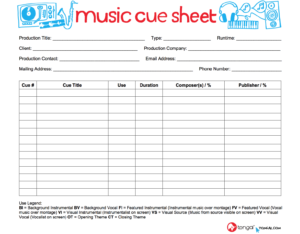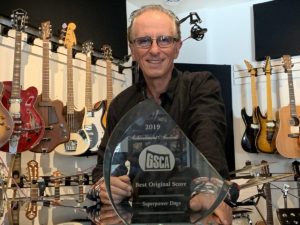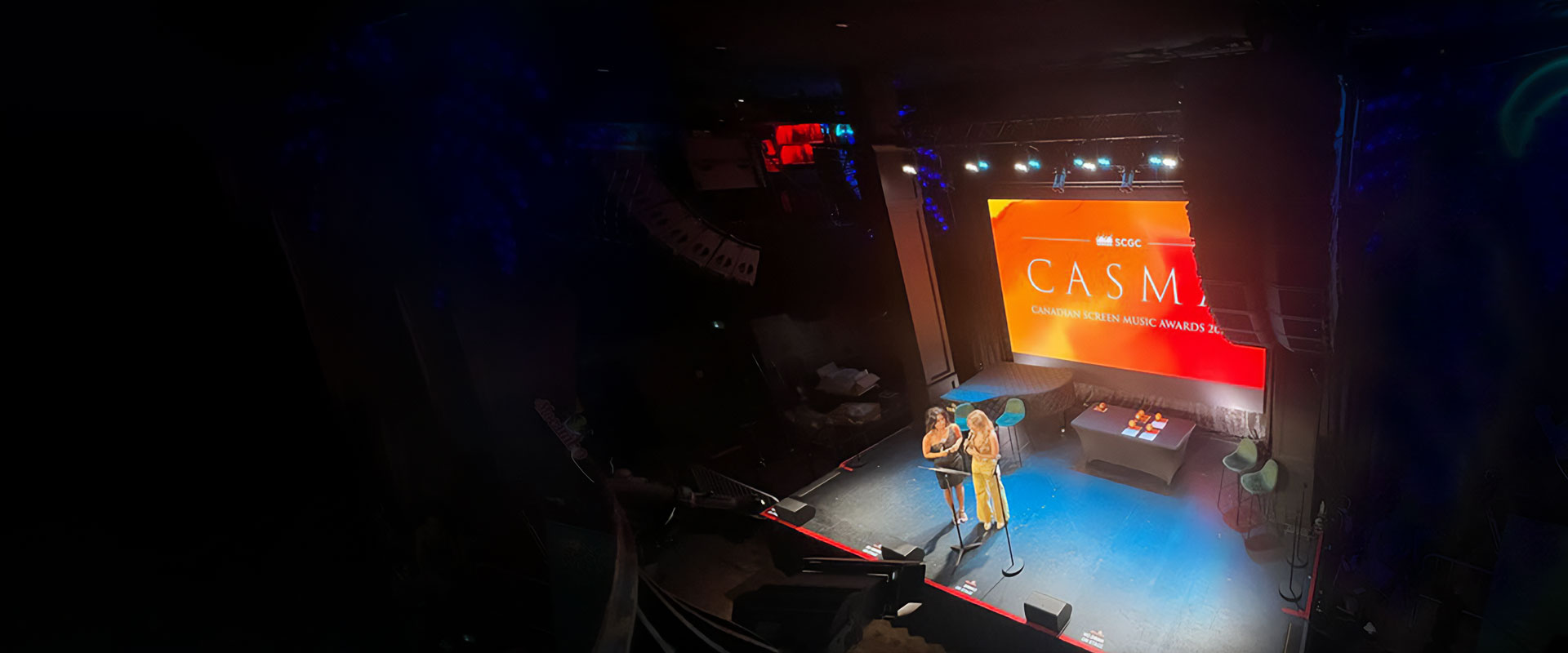 View from the Podium
View from the Podium
by John Welsman
There have been so many changes in the past year that affect music creators. New AV streaming services coming online, the success of the EU Copyright Directive, Netflix’s attempts to direct license music for their own service, the merging of SOCAN RR into SOCAN, challenges to the Mechanical Licensing Collective in the US to name just a few. The work being done on behalf of screen composers by the SCGC Board on so many fronts seems endless.
Marvin Dolgay, Tonya Dedrick and I recently returned from a CIAM (The International Council of Music Creators) meeting in Budapest at which, for the first time, an AV Composers Working Group was struck. We held a meeting with delegates from many a number of countries to discuss matters of common interest, the latest trends and what our hopes are for the immediate future. The conversation and exchange of information was extremely valuable, and will help inform the way forward for AV composers and songwriters here in Canada. One of the most important items discussed was the export of the main features of the Copyright Directive, which was successfully passed in Europe earlier this year. The AV Working Group will continue to explore this subject. We’ll learn how ECSA (European Songwriters and Composers) achieved what they did in the face of huge, well-funded and well-organized opposition from Google and others, and consider what we can do here to achieve similar results in Canada. The timing is good, and we must strike while the iron is hot. We have a Copyright Review and a Broadcasting Act Review underway at this time, and our legislators and bureaucrats are listening to the music industry for solutions to the challenges we face. In fact, in recent a meeting with the people form the Department of Canadian Heritage we learned they’re looking at what was passed in Europe to see what might apply in Canada.
The SCGC has identified a top priority for the coming months, and that is to help convince the CRTC to level the playing field for both our screen industry and the news media.  The CRTC has the power to do so by removing the Digital Media Exemption Order that was put in place when the internet was in its infancy. It’s time for the streaming platforms to be reclassified under the Broadcasting Act as the broadcasters they are, so they fall under the regulatory system that ensures a percentage of their revenue goes into the Canada Media Fund to support the production of Canadian content. Our sector of the industry should benefit greatly as a result of this simple and fair change.
The CRTC has the power to do so by removing the Digital Media Exemption Order that was put in place when the internet was in its infancy. It’s time for the streaming platforms to be reclassified under the Broadcasting Act as the broadcasters they are, so they fall under the regulatory system that ensures a percentage of their revenue goes into the Canada Media Fund to support the production of Canadian content. Our sector of the industry should benefit greatly as a result of this simple and fair change.
The streaming services should also be required to abide by Canadian content rules, and increase discoverability of Canadian programming on their platforms so Canadians are better aware of what’s on offer in the way of Canadian stories told to Canadians by Canadians. This is our cultural heritage as a sovereign nation, and well worth promoting and preserving.
Europe has seen fit to tax the streaming services operating and profiting in their territory, and so should Canada. To call it a ‘Netflix tax’ is misleading. It will be a tax on businesses operating in Canada just like the taxes paid by every other businesses operating here.
 We can’t afford to rest. Your Board of Directors, along with the other creator and music organizations at ACCORD, is working diligently on these and other issues. We have to be vigilant if we are to preserve the value of copyright for the future.
We can’t afford to rest. Your Board of Directors, along with the other creator and music organizations at ACCORD, is working diligently on these and other issues. We have to be vigilant if we are to preserve the value of copyright for the future.
Your role in this? Your membership in the SCGC is your way of saying ‘I’m not alone working as a screen composer here in Canada. I’m a part of something much larger – an organization which has increasing visibility and effectiveness in bringing about change within our sector.’ For a volunteer Board to continue channelling their energies to bring about this change, knowing we have the support of our membership is a key component. When the opportunity arises, please take a moment to acknowledge this very capable group of people who represent your interests with such energy and dedication.
And thank YOU for being a part of the change that is coming.
 Saying “No” Can Lead to a Positive Life as a Composer: Understanding Negotiation
Saying “No” Can Lead to a Positive Life as a Composer: Understanding Negotiation
By Spencer Creaghan
A NOTE TO THE READER: I have geared this article to focus primarily on the issues revolving around the aspiring, emerging, and early/middle established composers, for this generation to better understand the concepts of Hard Work and Professionalism. For the older generations, perhaps this article can be used to better understand the climate and problems us younger composers are facing based on the changing times, lack of back end revenue, over flux of passion projects/micro budgets, and a greater number of collaborations working with productions that have a lack of understanding/education on the music side of the film business.
I believe that all points stated in the article can be applied to the upper and lower levels of success, however I also believe that the higher up on the success spectrum you are, the more experience you’ve gained over your long and fruitful career at already knowing how to handle these issues. So while I hope you enjoy this article, I must say, this is not so much for you as it is for the next generation. I’ll be focusing on the demographic I am more familiar with and I am sure we can all apply the ideas to our own levels of success. Thank you!
The arts community is a funny one. We complain about being over-worked and under-paid. We tweet and post about how we have to work weekends, holidays, long nights, and 16-18 hour days, all for almost no money, and yet… secretly, behind those annoyed words, we revel in our complaints, as if we aren’t truly deserving of any kind of success until we’ve reached this level of worker abuse. We all know the icebreaker:
“Hey, how’ve you been?”
“Oh, you know, working 12 hour days. Haven’t slept. Gotta pull another long weekend. You know how it is?”
“Yeah, totally! I feel you.”
Well, I’m here to call bullshit on this mindset and any one of us, myself included, who has secretly gloated and revelled in the over-worked/under-paid lifestyle. Letting  ourselves be taken advantaged of as if it’s some kind of rite of passage and we’re earning success and respect from it. Any one of us who has avoided saying, “no” in fear that it might lose us the job; any one of us who hasn’t set boundaries in fear that it might hurt our client relationship; that we “might not be hired back.” I’ll let you in a little secret: saying “no” only makes you more respected.
ourselves be taken advantaged of as if it’s some kind of rite of passage and we’re earning success and respect from it. Any one of us who has avoided saying, “no” in fear that it might lose us the job; any one of us who hasn’t set boundaries in fear that it might hurt our client relationship; that we “might not be hired back.” I’ll let you in a little secret: saying “no” only makes you more respected.
Last spring I attended a negotiation seminar directed towards freelancers in the arts and entertainment industry. While much was discussed in the seminar, there were some major points brought up that us composers could learn from. To detail one such point, our presenter had worked in various different fields, jobs, and work environments, and in different hierarchies of each environment. During this time they did some analysis work and started to map out exactly how many hours of work someone spent on the given task they had to accomplish that day and how much of the task they accomplished in said timeframe. They hired some extra analysis help to gain numbers from other lines of work. What they discovered was that on average, regardless of your field, a human being spends 4 hours a day on the task they were supposed to do that day and completes what they needed to complete in those 4 hours.
Let me repeat that: a human being spends 4 HOURS a day on their projected task for that day. For the presenter, this was doing the dedicated work on a video game level that day. For us composers, this would be writing 1-2 cues of the usual two-minute length. I began timing my own work patterns and asked any colleagues who didn’t mind sharing their own habits, and to no surprise, I discovered a similar number. For us composers, 4-6 hours of composition work on a given project per day was the average.
Now let me clarify, this isn’t to say that from Monday-Friday, we should work from 10am-2pm then go home and lounge the rest of the day. Far from it. Instead what this study  was meant to get a better understanding of how we work and remind us that: “Life happens when you’re busy making other plans.” Emails, phone calls, meetings, grocery shopping, cleaning, travel, errands, children, significant others, pitches, contracts, networking events, printing stems, prepping projects, spotting sessions, sending out invoices, recording musicians for demos, recordings musicians for final mixes, mixing, eating, and, if you’re like myself, the “subconscious writing” period – or “procrastination” as it’s better known as. All of these take time away from our writing, the very thing we’ve been hired to do. When we take all of this into affect, one can see why 4 hours is the average. As artists, we may spread this out. Maybe Monday we do 8 hours, Tuesday we do 2 hours, Wednesday we do 6, Thursday is email/business catch up day, (no writing here,) and then Friday we top off with 4 hours. In this week we’ve still accomplished our workload and the math evens out.
was meant to get a better understanding of how we work and remind us that: “Life happens when you’re busy making other plans.” Emails, phone calls, meetings, grocery shopping, cleaning, travel, errands, children, significant others, pitches, contracts, networking events, printing stems, prepping projects, spotting sessions, sending out invoices, recording musicians for demos, recordings musicians for final mixes, mixing, eating, and, if you’re like myself, the “subconscious writing” period – or “procrastination” as it’s better known as. All of these take time away from our writing, the very thing we’ve been hired to do. When we take all of this into affect, one can see why 4 hours is the average. As artists, we may spread this out. Maybe Monday we do 8 hours, Tuesday we do 2 hours, Wednesday we do 6, Thursday is email/business catch up day, (no writing here,) and then Friday we top off with 4 hours. In this week we’ve still accomplished our workload and the math evens out.
So, how does this all tie back into negotiation? I had a conversation with my business advisor not long ago where he recommended that one project of every month should cover at the very least your expenses for the month. For projects that last more than a month, he said to apply the same rule for each month the project will take. Income made from all other projects in this time should be bonus spending money. Based on recent analysis, living in Toronto costs someone in their 20s-40’s around $3,300/month. Now it’s math time…
 If we take this as a new bench mark for hours/day worked and we know that the new standard for composer output is 4 minutes/day, that is essentially 1 minute/hour or 20minutes/week – and this isn’t taking into account changes and notes, which are bound to occur, so lets pull this back to a healthy 15 minutes/week of completed music.
If we take this as a new bench mark for hours/day worked and we know that the new standard for composer output is 4 minutes/day, that is essentially 1 minute/hour or 20minutes/week – and this isn’t taking into account changes and notes, which are bound to occur, so lets pull this back to a healthy 15 minutes/week of completed music.
The SCGC has a standardized rate of $500/minute of music. That means we should be making $2,000/day or $7,500/week on any project that would require those 15 minutes/week benchmarks – definitely a healthy amount to live off of in Toronto. Well, as I’m sure many of you are saying aloud, “HA!! If only!” and you would be right. Based on current budgets in the film world, the majority of composers, (especially younger composers,) are lucky if they get $7,500 for even a feature film, let alone a short film! How do we make this work then?
Let’s focus on independent low budget feature films for the moment, as this is the market I personally work in the most and it’s the market I feel many of our SCGC colleagues are a part of as well. Most low budget indie feature films spend between $3,000-$15,000 on their music budget, getting as high at $30,000 as they reach mid-budget filmmaking. Based on a previous SCGC analysis of composer feels, we have found an average of about $8,000 for low budget indie feature films. Not a bad fee, especially if you can finish it in a month or two. It still keeps within the Toronto living wage gap.
Most low budget short films pay as little as $500 to as high as $5,000, averaging around $2,000. This, while still low, isn’t a bad average if you can complete it in 1-2 weeks and can manage to score 2-4 shorts a month. Still a liveable wage. In terms of minutes of music, indie features require around 20-60 minutes of music, balancing at about 40 minutes of music. Short films average about 5-12 minutes of music, balancing out at 8 minutes. Based on these numbers we are already being under-cut from the SCGC recommended rate, so let’s go through some scenarios where “No” can be a useful tool in helping make everyone happy and keep us working at a healthy hourly rate.
Lets start by the classic negotiation strategy of aiming well beyond what you’d expect to get, to land on what you’d be happy to get. To keep our numbers simple let’s stick with short films in this example. Say a short you’re working on has 8 minutes of music, and you start by quoting the production your $500/minutes of music rate for a total music budget of $4,000. You never know, you might get this rate – (I have!) If you don’t, the next best scenario would be walking away with half of that, which lines up with the SCGC analysis of what short films usually pay. Not a bad fee. Next best after that would be walking away with $1,000 – but keep in mind that as the number drops, you’ll need to hold your to boundaries stronger and stronger, saying “no” more.

Let’s say they come at you with an $800, budget for a 15 minute short, 8 minutes of orchestral music. There’s no set deadline, but the film is great and the team is great. You want to be a part of it, but $800 is too low for you to justify being able to work on it based on living costs, work-life balance, other projects you need to work on that month, etc. Remember, the lowest paying jobs are often the most amount of work and the most difficult. Here are some tricks I might try at this point:
– “I’m sorry, that’s too low. I would absolutely love to work on your film, but unfortunately at that rate I won’t be able to give you the time and attention you deserve. How about $3,000?”
Pick a number between your $4K asking and their $800 original fee. Keep doing this until you and the producers are happy, remembering your lowest “walk away” number.
-“To make finances easier for you, how would you feel about a payment plan?” I find a weekly retainer, monthly splits, and 40% up front/40% half way in/20% at the end payment-plans are helpful in getting your rate and allowing the client time to gain the funds.
– Another useful tool connected to the above can be to give your client set days of the month you’ll be working and ask them to be available during that time for any notes/calls/meetings/etc. For example: “I can give you 3 days next week and another 2 days the week after.” In this scenario, we make sure we’ve planned properly – we’d write the score those 3 days and reserve the next 2 days for notes/changes, then that’s it. You’re done. They’re done. Should they want any more notes after this stage, it’ll have to cost them. Put up the wall – you have to move on. I find this works best with projects that don’t have set timelines and can be a great alternative to using “The Wheel” (Good/Cheap/Fast – Pick two.) Giving set days to work on the film puts you back in the driver’s seat of the negotiation and allows you to start planning your months, as you sort out work life balance – always remembering that 4 hours/day working average so as not to overwork yourself. (Burn out sucks. Avoid it.) This method also puts up walls for changes, ensuring your client really thinks about which correction-hills are worth fighting for.
 If after all of these ideas, they are still not satisfied, then be ready to walk away completely. Regardless of how good the film is and how much you want to score it. A good negotiation occurs when both parties feel comfortable and trust in each other. If you do not feel comfortable, it is not a good negotiation, and you can walk away. If they want you badly enough they’ll meet your requests, if not, they may not be worth working with in the first place.
If after all of these ideas, they are still not satisfied, then be ready to walk away completely. Regardless of how good the film is and how much you want to score it. A good negotiation occurs when both parties feel comfortable and trust in each other. If you do not feel comfortable, it is not a good negotiation, and you can walk away. If they want you badly enough they’ll meet your requests, if not, they may not be worth working with in the first place.
Now, let me quickly interject with this: John Powell recently said in an interview, “We’re getting paid the big bucks; don’t harp over notes/changes and don’t complain about the late nights or weekends.” At his level, sure he may be correct – and perhaps for some of you reading this, the same will be true for you. However, the bulk of us are not John Powell and we are not working to his kinds of budgets or even a 5th or 10th of his budgets. Because of this we cannot pretend as if we are and we cannot work as if we are. Working 16 hour days, or weekends, or holidays, when we’re being paid pennies to do so is NOT okay. This, in my view, does not make one a professional. If repeated continuously – and on nearly every project – this habit is where self-abuse, worker-abuse, over-working, anger, resentment, and mental-health breakdowns occur. When not checked, this leads to negative black-lash at the wrong times, which can end what were originally good working relationships.
I recently saw a Facebook post that read, “People working on your film could lose their families, friends, and mental-health over your film… make sure it’s a good one.” While the sentiment is there, I’d like to take this a different direction:
Do not lose your friendships, family, significant other, or mental-health over a film that does not respect you. Put up boundaries, say no, hold true to yourself and your worth. You are a human being who deserves love and respect. No film paying you a fraction of your rate and then asking you to double or triple your work load, is worth losing yourself to. No, it doesn’t “get better when/if the production company would only….” It only gets better you decide to put those walls up or correct bad habits. We have to be smarter than this. Whether you worked 16-18 hours a day or worked on Easter, if you did it for $500 and almost lost your partner over it or your sanity, then you need to apply better boundaries. That’s on you, not the film.
 At the end of this all, what I’m hoping you, the reader, will walk away with is how to better plan your day, your output, and bust any myths that have been gathered over the years about success and professionalism. I’d like now to offer some “work smart” habits to counter “work hard” habits:
At the end of this all, what I’m hoping you, the reader, will walk away with is how to better plan your day, your output, and bust any myths that have been gathered over the years about success and professionalism. I’d like now to offer some “work smart” habits to counter “work hard” habits:
– Instead of working 16 hours a day, can you achieve the output of a 16-hour day in 6 hours? I personally use Theme Suites primarily in my writing. I’ll use my cue-sheet as a thematic blueprint to see where themes can exist, then write a few suites and start temping them to the individual cues. It won’t be 100% perfect, but if the theme is right, it might be 80% perfect – the last 20% is just a few adjustments here and here. Hans Zimmer, Lorne Balfe, James Newton Howard and Bear McCreary all use this method. It maximizes their output without compromising their musical integrity and keeps their days more normal. Understanding your workflow and how to cut out wasted time will ensure you have higher output in your 4-6 hour day.
– Print your stems at the end of the day, instead of the end of the project. Even if your template is messy, stem printing per day keeps the flow of the day going. If you have a smooth template, your stems will print at whatever length your cue is and you’re done. If your template is messy, it may take a bit longer, but you can use this time to wind down, catch up on emails, or prepare dinner. By having stems printed you’re ready to go for the mix and you may even be able to use these stems in other cues, once again maximizing output without putting in more work hours.
– If the changes are minor, make “NOTES” sessions, by importing your stems into a new session and make any adjustments here. Track counts will be less and I find it’s generally easier to make adjustments with audio than with MIDI… especially if those adjustments involve picture changes. Now you’re music editing, not composing, which is saving you more time for writing.
– Instead of feeling you must do everything yourself, see if you can delegate tasks out to friends and colleagues. This might include mixing, music editing, synth design, orchestration, copying, engineering, etc. Maybe even writing the odd cue here and there based on your themes. There is nothing wrong with asking for help. Most composers in  the higher echelons embrace their teams – Bear McCreary has a great ASCAP talk about it – and their clients love them for it. You’re only as a good as your weakest member and in certain areas that member might be you. Yes, this usually requires a bigger budget, and if so, good! Its one more point to show how professional you are, that your fee matters, and that you understand your worth and your team’s. Just be sure to give credit where credit is due.
the higher echelons embrace their teams – Bear McCreary has a great ASCAP talk about it – and their clients love them for it. You’re only as a good as your weakest member and in certain areas that member might be you. Yes, this usually requires a bigger budget, and if so, good! Its one more point to show how professional you are, that your fee matters, and that you understand your worth and your team’s. Just be sure to give credit where credit is due.
– Instead of doing notes through email, get your directors/producers on a call; have your suggestions ready to go, or bring them to your studio and make all adjustments with them in the room. I find this can be smoother and avoids any dreaded email-translation misunderstandings. It also lets your director feel part of the creation of the score, which they’ll love!
– Know when your best work hours are and stick to those. Just because your buddy composes late at night doesn’t mean you have to. Build the rest of your day from there. I know some composers build their schedule around when they can see their family, and this is also great. Find what’s best for you to live a happy, healthy life!
– You don’t need to finish an entire cue in one day. Sometimes sketching out many cues, then slowly working them out day by day, can create more output/day in the long run. Maybe work 4 cues a day, each for an hour to accomplish a little on a lot slowly, getting you to the finish line. This strategy also allows for that clarity that can arise the next morning to help solve compositional obstacles.
 At the end of it all, there will always be obstacles and problems. Approaching them with confidence, clarity, and conviction will make you more professional and lead to success. While it might seem strange, it’s these boundaries that win the day and get you hired again. Hans Zimmer and John Williams get hired again not because they’re “good,” but because they bring their individuality to the table. They surprise filmmakers with ideas, they push creativity, and they solidify boundaries necessary to deliver high quality products. In the past few months, I’ve had quite a few filmmakers say that they wanted me to push back on ideas, bring stuff to the table, and challenge them. Yes, they are the captain of the ship, but good collaboration values collaboration. You’re one half of the whole too, so trust yourself: collaborate!
At the end of it all, there will always be obstacles and problems. Approaching them with confidence, clarity, and conviction will make you more professional and lead to success. While it might seem strange, it’s these boundaries that win the day and get you hired again. Hans Zimmer and John Williams get hired again not because they’re “good,” but because they bring their individuality to the table. They surprise filmmakers with ideas, they push creativity, and they solidify boundaries necessary to deliver high quality products. In the past few months, I’ve had quite a few filmmakers say that they wanted me to push back on ideas, bring stuff to the table, and challenge them. Yes, they are the captain of the ship, but good collaboration values collaboration. You’re one half of the whole too, so trust yourself: collaborate!
Similarly, a good negotiation is an agreement between two parties. If you are not happy with the agreement, you mustn’t conclude the negotiation until you are and they are. Bring your own ideas to the table, hold your ground on things, and be okay with losing some battles along the way. In the course of my career, the biggest rewards came from me saying, “no” to something that would be problematic later on, and the biggest challenges arose when I said, “yes” to something that Murphy’s Law put a red flag up to but I ignored because I was being “nice” or “scared.” While I believe whole-heartedly that people are good, we also make mistakes, and we make the biggest mistakes when we don’t fully understand things, situations, or each other. These mistakes have consequences when misunderstandings arise – when those gut-warnings are ignored, the red flags are brushed off, or the ignorances aren’t corrected. Catch these early, treat them (and yourself) with respect, and be comfortable saying “No” when you feel the time is right.
I decided to write this article because I believe that the common mentality that composers should be “yes people” is hurting not only us as a group, but our industry as a whole. As deadlines and budgets become increasingly short, demands are becoming increasingly large, and I believe we are at a point where we need to start putting up boundaries. To do so, we need to understand our craft, how long it takes, how hard it is, and how quickly our days fill up to better understand how to create boundaries, so that we can respect our own time.
When we realize how few hours each day we actually have to work, how many minutes we should write a day, and how much we should be paid to achieve those output requirements, then we start holding stronger boundaries. Boundaries are a big discussion right now in relationships and friendships, and business relationships should be  included in this as well. Saying “No” is part of creating a healthy relationship. Good clients respect the “No” and will approach it with sympathy and empathy, allowing for you both to come to a better solution. Bad clients will be annoyed with the “No”, and the more you say it, the more power you’ll have in the negotiation. If they want something from you enough, they’ll need to agree to your terms.
included in this as well. Saying “No” is part of creating a healthy relationship. Good clients respect the “No” and will approach it with sympathy and empathy, allowing for you both to come to a better solution. Bad clients will be annoyed with the “No”, and the more you say it, the more power you’ll have in the negotiation. If they want something from you enough, they’ll need to agree to your terms.
Say “No.”
We don’t have a Union, but we do have a Guild – a group of composers who share war stories and battle tactics, and who can help guide each other in the right direction when the obstacles present themselves. We don’t need to boast about the 12-hour workdays, the weekends, or the holiday workings. Often, we’re the only ones who know we’re doing it. We don’t tell our clients that we’ve worked over time – we tell our colleagues and rant about it to our families/friends. Our clients seldom know that we’re working these insane hours for little money, so why do it in the first place? We all know it’s bad, so let’s stop. Instead, let’s shift the discussions to which boundaries we can put in place and what alternative working strategies we can utilize to live healthy, happy lives, keeping ourselves and our clients excited about this wonderful privilege we have of working in the field we love! Happy writing everyone!
Compiled by Elizabeth Hannan
Events and Appearances
-Daryl Bennett and writer/producer Damon Vignale ran our ‘TV Scoring Seminar Series’ in BC.
-Felipe Téllez presented ‘Generative Sound Ideas for Film and Media’ at the Toronto Sound Festival.
-Janal Bechthold, Suad Bushnaq, and Steph Copeland spoke on the panel ‘Composing for Film and Television vs Performance’ at the Toronto Sound Festival. Rose Bolton moderated the panel.
-The SCGC hosted an ‘AMA’ with Maxime Goulet moderated by Janal Bechthold.
-Adrian Ellis and Erica Procunier spoke about their work and process at Massey College’s Music Club.

-John Welsman, Marvin Dolgay and Tonya Dedrick attended the CIAM General Assembly in Budapest.
-Ryner Stoetzer moderated the panel ‘Scoring Your Film from Start to Finish’ at the Forest City Film Festival. Janal Bechthold and Spencer Creaghan were panelists.
-Adrian Ellis spoke about ‘Alternate Scoring Tools’ at Toronto Ravel.
-Janal Bechthold was an industry expert who met directors in the WIDC Career Advancement Module (CAM) at the St. John’s International Women’s Film Festival.
-Duane Andrews presented ‘Scoring for Film: What, Where, and How?’ at Making Music Work.
-Adrian Ellis lead the panel ‘A Closer Examination: The Music of The Good Doctor’ at the Vancouver Film Festival.
-Stephanie Hamelin Tomala was selected with 11 other composers to attend the SESAC Score workshop: ‘The Beck Diversity Project’ with Danny Lux.
Awards and Recognition
-Suad Bushnaq was nominated for ‘Best Original Score’ at the Hollywood Music In Media Awards with the film ‘A Very Important Appointment’.
-Tom Koroluk scored ‘Green Run’. The film was one of nine chosen for the CBC Short Film Face Off.

-Michel Cusson won ‘Best Original Score’ for the IMAX film ‘Superpower Dogs’ at the 2019 Giant Screen Cinema Association Achievement Awards.
-Joey Reda was selected as one of the 12 finalists at the European Talent Competition.
-Stephanie Hamelin Tomala, Evan MacDonald, Spencer Creaghan, Virginia Kilbertus, Nick Grimshaw, and Joey Reda won SOCAN Awards for Emerging Audio-Visual Composers.
Premieres and Screenings
-David Federman scored ‘Haru’s New Year’. The film screened at the Aaretaler Kurzfilmtage (Short Film Festival), Diaspora Film Festival, Seoul International Senior Film Festival, and the Canadian Diversity Film Festival.
-David Federman scored ‘The Monster in Me’. The film was a promotional piece for the Blood in the Snow Canadian Horror Film Festival.
-Stephanie Hamelin Tomala scored ‘Everything Must Go!’ directed by Lee Gallagher. The film screened in the short animation program at the Austin Film Festival.
-Adrian Ellis scored ‘Last Call’ and recorded the score all in one take. The single-take film premiered at the Royal Cinemas in Toronto.

-Neil Parfitt scored the animated series ‘The Remarkable Mr. King’. Erica Procunier composed the opening theme. The series premiered on Treehouse in October.
-Peter Chapman scored ‘Riot Girls’. The film screened in Toronto in September.
-Felipe Téllez scored the short film ‘From The Thunder’. The short screened in Toronto in September.
-Erica Procunier scored ‘Wataway’. The film screened at the Vancouver Film Festival.
-Evelyne Datl scored the CBC documentary “Saving Rabbit”. The documentary premiered on CBC in September.
-Elizabeth Hannan scored ‘Finding Harold’. The short film premiered in Sydney, Australia at the Short and Sweet Film Festival.
-Ally Fiola scored the short film “It’s Only Monday” by Nicole Steeves. The short film was an official selection at the Broad Humor Film Festival in Venice, California.
-Virginia Kilbertus scored the film ‘Astronaut’ (directed by Shelagh McLeod). The film opened in Toronto in July.
-Elizabeth Hannan scored ‘See You Tomorrow’. The short screened at the Festival Internacional de Cine con Medios Alternativos in Mexico City and also at Dutch Media Week in Hilversum.
-David Federman scored ‘Her Story (In Three Parts)’. The short screened daily in Los Angeles as part of Fourwalled Films’ 2019 Short Film Series.
-Sean James Boyer scored ‘Killer Affair’. The true crime series is now available on the Oxygen Network.
Hamilton Film Festival:
-Adrian Ellis – ‘Music of Maddness’
-Adrian Ellis – ‘Last Call’
-Adrian Ellis – ‘To Hell With Harvy’
-Elizabeth Hannan – ‘Finding Harold’
Atlantic International Film Festival:
-Neil Haverty – ‘Body & Bones’
-Neil Haverty – ‘Hot Flash’
-Ally Fiola – ‘It’s Only Monday’
-Jeff Johnston – ‘Ice Breakers’
-Jeff Johnston – ‘Luben and Elena’
St. John’s International Women’s Film Festival:
-Janal Bechthold – ‘Night Shoot’
– Neil Haverty – ‘Body & Bones’
-Jeff Johnson – ‘Luben and Elena’
TIFF:
-Lesley Barber – ‘American Woman’
-Antonio Naranjo – ‘Volcano’
-Mychael Danna – ‘Guest of Honour’
-Howard Shore – ‘The Song of Names’
-Mark Korvan – ‘The Lighthouse’
Fantasia Festival:
-Stephanie Hamelin Tomala – ‘L’ inquiétante absence’
-Michelle Osis – ‘Harpoon’
-Lora Bidner – ‘Wild’
-Janal Bechthold – ‘Brave Little Army’
Now Available to Stream

-Erica Procunier scored ‘Ghost Writer’. The series is now available on AppleTV.
-Lesley Barber scored ‘Four Weddings and a Funeral’. The series premiered on hulu in July.
-Suad Bushnaq scored the CBC Gem mini series ‘Ashbridge’. The series is available now online.
–
–
Other Releases and News
-Adrian Ellis was interviewed by ‘View Hamilton’
-Jayla Damaris was one of the feature composers at ‘Hear Her Score’ in Burbank.
-Adrian Ellis was featured in the documentary ‘The Music of Madness’.
-Tom Koroluk scored ‘Mystic River’ produced by Native Media.
-Tom Koroluk scored Colore’ produced by Mugosa Media.
-Ken Myhr scored ‘She Walks with Apes’.
-Jason Hogan scored ‘The Couch’. The film score was performed with a live orchestra at Film Score Fest.
-Tom Koroluk scored the horror/sci fi thriller ‘The Return’ produced by Strata Studios.
-David Federman scored Season 5 of the Radio One podcast ‘Someone Knows Something’.
-Adrian Ellis was featured on the podcast ‘The Annotator’.
********************
 Editor’s Pick
Editor’s Pick
by Virgina Kilbertus
CBC will no longer work with Netflix to produce shows, says Catherine Tait
https://business.financialpost.com/telecom/media/cbc-will-no-longer-work-with-netflix-to-produce-shows-says-catherine-tait?utm_term=Autofeed
Musicians Fear for Livelihood Without TV & Film Streaming Residuals
https://www.billboard.com/articles/news/8532754/musicians-fear-for-livelihood-without-streaming-residuals
Ubisoft Loses Its Guitar-Teaching Video Game Patent Case
https://www.digitalmusicnews.com/2019/08/15/ubisoft-rocksmith-patent/
The World Soundtrack Awards Are An Ideal Moment To Put The New Generation Of Composers In The Spotlight. Lady Gaga, Post Malone Among World Soundtrack Nominees
https://variety.com/2019/music/news/lady-gaga-post-malone-2019-world-soundtrack-awards-nominees-1203300430/
Amazon Music Unveils High Definition Audio Streaming Service
https://variety.com/2019/music/news/amazon-music-unveils-hd-highest-quality-audio-streaming-1203338552/
People Can Hear The Difference In High Resolution Audio, Study Finds
https://phys.org/news/2016-06-people-difference-high-resolution-audio.html
The MET Will Stage Its First Opera By A Black Composer
https://www.nytimes.com/2019/09/19/arts/music/metropolitan-opera-black-composers-terence-blanchard.html
Creativity Is A Muscle, Not A Skill. Here’s How To Build Yours
https://www.inc.com/quora/creativity-is-a-muscle-not-a-skill-heres-how-to-build-yours.html?utm_medium=40digest.7days3.20190817.home&utm_source=email&utm_content=&utm_campaign=campaign












